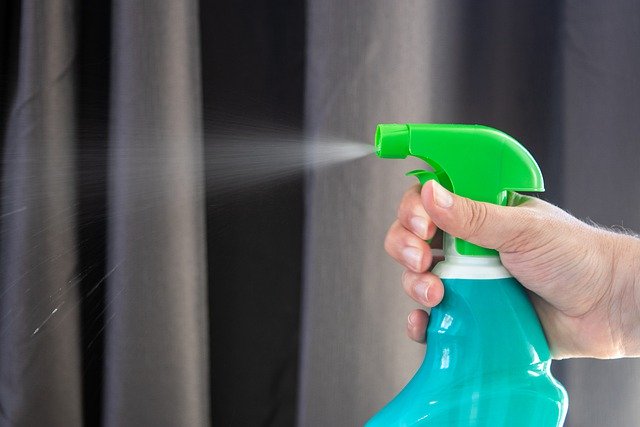07 July 2020
The cleaning and FM sectors are being urged not to over-rely on disinfectants that risk a negative impact on the environment.
InnuScience, a commercial cleaning manufacturer is instead emphasising on effective cleaning using high performing detergents rather than relying on disinfectants.
The biotech company is advocating a cleaning regime called “Justified Disinfection” which encourages disinfecting only where and when it is useful and relevant.
What is “Justified Disinfection?”
Steve Teasdale, the Co-Founder and Vice President of Scientific Affairs at InnuScience, explained: “Justified Disinfection is the principle that effective cleaning with high-quality detergents across all non-critical touch surfaces is as effective, if not more so, than the widespread systematic or abusive use of disinfectants.
“There is also a need to continue to look after our environment. This has been at our heart since we began”.
InnuScience warns that regular and widespread use of disinfectants does not provide a clean surface as “disinfectants do not clean per se, promoting the development of bacteria”, and recommends they should only be used on critical high-frequency touch surfaces.
The company suggests effective regular cleaning is most appropriate for all non-critical surfaces such as floors, urinals, ceilings and most walls as these are areas that are not typically touched and do not represent “a real biological risk to health”.
Environmental Waste and CSR
"There is a big challenge facing offices reopening, and this goes beyond space planning and social distancing. Companies must play their part in slowing the spread of communicable diseases in areas of high contact, whilst at the same time not compromise their Corporate Social Responsibility aims."
–Dr Rachel Dick
Associate, Rider Levett Bucknall
As FMs look to reassure their buildings’ visitors of their high hygiene standards, it can’t be ignored that increasing use of any cleaning chemical will inevitably have an environmental impact. Certain disinfectants have been linked to acute and chronic health issues, residues of disinfectants washed down the drain may trigger the growth of disinfectant-resistant microbes and an over-reliance on single-use plastic packaging remains a problem
Dr Rachel Dick, Associate at Rider Levett Bucknall and TWinFM Editorial Advisory Board member, commented that her clients were becoming increasingly concerned with balancing their environmental responsibilities with keeping their buildings safe:
"There is a big challenge facing offices reopening, and this goes beyond space planning and social distancing. Companies must play their part in slowing the spread of communicable diseases in areas of high contact, whilst at the same time not compromise their Corporate Social Responsibility aims.
This can be achieved in the form of selecting products which do not cause harm to the environment. This is a conversation I'm having with many of my clients currently, both within the public and private sector. Businesses are very concerned about ensuring the workspace is operational, but they also want to meet and achieve their environmental commitments."
Picture: A photograph of a plastic spray trigger bottle
Article written by Ella Tansley | Published 07 July 2020
Share
Related Articles
ALFA Eco Tech Launches “Mechanical Solution” to Virus Transmission
CoviX101 is a non-toxic product that claims to use molecular nano spikes to kill microorganisms.
Developed by ALFA Eco Tech, when CoviX101 is applied to a surface it...
Read Full Article
Are Offices a Greater COVID Risk Than Supermarkets and Restaurants?
Data from Public Health England suggests that office environments have had more COVID outbreaks than other workplaces.
Figures obtained by the BBC 5 Live...
Read Full Article
Controlling Infection on Touchpoints With Antimicrobial Technology
As a direct result of the COVID-19 pandemic, keeping touchpoints in any building clean and safe has taken on an urgent significance in 2020.
Despite UK...
Read Full Article
BICSc Releases Long-Awaited Industry Standards and Best Practice Guidelines
The British Institute of Cleaning Science has released the much-needed industry publication: “BICSc Standards & Best Practice.”
At a time where...
Read Full Article
NHS Trials “Unique” New Decontamination Tech to Reduce COVID Transmission Indoors
The NHS is trialling a new technology solution which claims to replicate the science of outdoor air in indoor spaces.
Airora Professional, developed by PA Consulting...
Read Full Article
Five Cleaning Tips to Make Your Workplace COVID-Secure
As the government changes its advice to “work from home if you can” amidst a national increase in coronavirus cases, good hygiene in the workplace has never...
Read Full Article
Italian Airport First in the World to Receive COVID Five-Star Rating
Rome Fiumicino Airport is the first airport in the world to be certified with the COVID-19 Five-Star Airport Rating, by international air transport rating agency...
Read Full Article
Haz-Mat Suits in Cleaning – Due Diligence or Scaremongering?
The image of cleaning operatives in full hazardous material whole-body PPE has become a familiar one in 2020 - but are there occasions where we should question its...
Read Full Article
ABM Forms Expert Advisory Council to Support COVID Response
ABM has established an Expert Advisory Council, composed of external leading experts in infectious disease and industrial hygiene.
The advisory board will...
Read Full Article
Cleaning and Hygiene – Is it now Everyone's Responsibility?
The British Institute of Cleaning Science and Kimberly-Clark Professional are calling for robust hygiene training for all staff, not just the cleaning...
Read Full Article

.gif)
.gif)



.gif)





.png)

.png)
